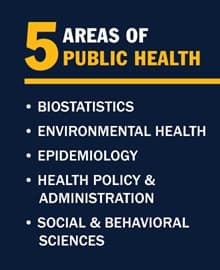What Can You Do With a Public Health Degree?

Understanding the Numbers
When reviewing job growth and salary information, it’s important to remember that actual numbers can vary due to many different factors — like years of experience in the role, industry of employment, geographic location, worker skill and economic conditions. Cited projections do not guarantee actual salary or job growth.
There's much more to healthcare than giving a patient their annual physical in an office, treating a broken ankle in an emergency room or removing an appendix in an operating room.
Suppose you're interested in getting to the root of health issues that impact large populations of people, creating ways to improve the health of those populations and encouraging healthy behaviors. In that case, you might want to major in public health.
What is Public Health?
To say the field of public health is broad would be a significant understatement. Armed with a public health degree, you could work on projects ranging from designing programs to encouraging healthy behaviors such as getting enough exercise and following a healthy diet. Other public health projects may include writing health policies for a government agency and even researching ways to fight disease outbreaks.
In a general sense, public health is about examining the health of large groups of people rather than individual patients and what factors — including everything from the environment, genetics, culture and many more — might affect those groups' overall health.
Health education is important because it can focus on significant issues. It can encourage healthy behaviors to reduce the incidence of diseases and other health problems, for instance. It can also improve official and government response and preparedness for disease outbreaks or natural disasters to prevent health impacts.
 One thing that public health workers have in common is that they look at the health of groups of people rather than focusing on one individual at a time, according to Dr. Denise Bisaillon, the founder of Southern New Hampshire University's (SNHU) public health program and retired executive director of health professions and adjunct instructor.
One thing that public health workers have in common is that they look at the health of groups of people rather than focusing on one individual at a time, according to Dr. Denise Bisaillon, the founder of Southern New Hampshire University's (SNHU) public health program and retired executive director of health professions and adjunct instructor.
"Public health looks at populations. It doesn't look at individuals," Bisaillon said. She said that public health examines diseases, where they come from and how to prevent them.
Where you can work is equally varied. While many public health workers are employed by local, county or federal government agencies, many more also work for hospitals or other medical facilities, nonprofit organizations or managed care groups.
"There are a lot of opportunities," Bisaillon said. "It's a field that is growing due to the need to improve health before it requires medical treatment."
Careers in Public Health
While public health encompasses a wide range of fields, here are five areas that you may expect to encounter as a public health major:
Biostatistics
![]() A biostatistician is a statistician who works in healthcare and often creates studies. These studies decide what data to collect, how much data will be collected and then analyze that data, according to the U.S. Bureau of Labor Statistics (BLS).
A biostatistician is a statistician who works in healthcare and often creates studies. These studies decide what data to collect, how much data will be collected and then analyze that data, according to the U.S. Bureau of Labor Statistics (BLS).
For example, testing juvenile lead levels in a specific community could be a job for a biostatistician. Biostatisticians focus on data sets, numbers and analyzing and manipulating data to draw conclusions and recommendations about disease and health.
Bisaillon said that many biostatisticians work as consultants and are hired to be part of research teams on several projects simultaneously. BLS reports all statistician jobs are expected to grow by 32% through 2032, and the median annual wage for healthcare statisticians was $87,070 in 2023.*
Environmental Health
![]() A public health degree can also lead you to a career in environmental health, where you may examine the world around you and how the water, land and air affect health. "There's a whole area of study of how this impacts health," Bisaillon said.
A public health degree can also lead you to a career in environmental health, where you may examine the world around you and how the water, land and air affect health. "There's a whole area of study of how this impacts health," Bisaillon said.
Even within this subset of public health, you can explore a wide range of research and outcomes. You could find yourself studying various ways climate change influences health, such as whether warmer temperatures impact the spread of disease carriers like mosquitoes infecting people with West Nile Virus or the Zika virus.
You may also investigate ways to better prepare for natural disasters so that disease and illness aren't rampant because of contaminated water sources following a hurricane or flood.
"Environmental specialists try to avert more damage from occurring, but also how can we prevent environmental insults in the first place," Bisaillon said. According to BLS, environmental scientist jobs — including environmental health — are expected to grow by 6% through 2032, and these jobs had a median pay of $78,980 in 2023.*
Epidemiology
![]() As an epidemiologist, you may focus on data and determine what groups in your community are at risk for certain diseases or health conditions based on the unique risk factors and behaviors they have in common. Those factors include economic opportunities, culture, quality of education and social support — what Bisaillon called "social determinates of health." You could also learn how an epidemiologist measures the prevalence of disease in a community and ways to study it using statistical interaction and analysis.
As an epidemiologist, you may focus on data and determine what groups in your community are at risk for certain diseases or health conditions based on the unique risk factors and behaviors they have in common. Those factors include economic opportunities, culture, quality of education and social support — what Bisaillon called "social determinates of health." You could also learn how an epidemiologist measures the prevalence of disease in a community and ways to study it using statistical interaction and analysis.
Many epidemiologists work for local or state government agencies, according to BLS, while others work at hospitals, scientific and development research companies or colleges and universities. In 2023, the epidemiologist's median pay was $81,390, and BLS expects jobs to grow by 27% through 2032.*
If this aspect of public health interests you, learn more about what epidemiology is and how to become an epidemiologist.
Health Policy and Administration
![]() Health policy and administration experts specialize in formulating and writing policies that impact the healthcare industry, other health-related industries and the public. They can work to promote or lobby health initiatives among various stakeholders, such as legislators.
Health policy and administration experts specialize in formulating and writing policies that impact the healthcare industry, other health-related industries and the public. They can work to promote or lobby health initiatives among various stakeholders, such as legislators.
Degree holders work in multiple settings, including health policy research think tanks or healthcare administration at community health organizations. They may also function as program directors of local or state public health departments to run wellness, child health or other critical areas.
Health policy and administration experts may work in industry groups such as the American Lung Association or American Heart Association as lobbyists or health policy analysts that help draft proposed legislation and drive an organization's objectives.
According to BLS, healthcare administrators are also referred to as health service managers, and part of their responsibilities may include health policy. Health service manager roles are expected to grow 28% by 2032, and they earned a median salary of $110,680 in 2023.*
Social and Behavioral Sciences
![]() Social and behavioral scientists in public health are interested in human behavior, especially influencing behavior to encourage healthier habits, thereby increasing public health.
Social and behavioral scientists in public health are interested in human behavior, especially influencing behavior to encourage healthier habits, thereby increasing public health.
Many workers in this area design public health programs and receive grant money to administer efforts to encourage smoking cessation, for instance, or to increase your level of exercise. Others run studies to determine what aspects of our lives influence our behavior in specific ways, such as how the sponsorship of a soda company in a public high school affected students' soda consumption. According to BLS, sociologists earned a median salary of $101,770 in 2023, with a 5% growth in roles through 2032.*
While these are just five pillars of the public health field, you may have many more options once you complete your public health degree. "Every one of those areas have a wealth of jobs attached to them, and some jobs can be combined," Bisaillon said.
Find Your Program
Exploring Paths in Public Health
 As a student pursuing a Master of Public Health (MPH) online at SNHU, Lakin Clements '22MPH studied the expansive field and the different routes she could take in the profession. Regardless of the career, though, she knows how important it is for public health workers to care for others. "You have to have a heart for people," Clements said. "And I feel like I do."
As a student pursuing a Master of Public Health (MPH) online at SNHU, Lakin Clements '22MPH studied the expansive field and the different routes she could take in the profession. Regardless of the career, though, she knows how important it is for public health workers to care for others. "You have to have a heart for people," Clements said. "And I feel like I do."
When she completed her program, she landed a program assistant position with the Centers for Disease Control and Prevention (CDC), allowing her to move closer to her dreams of helping others. "Being able to work for CDC during a pandemic — I mean, what a time to be alive," Clements said.
Right away, she felt she could apply what she learned during her public health program — particularly the practicum — to her job. “I know I’ve grown for the better," she said. "I feel more confident."
If you're considering an MPH, you may want to look for programs that are accredited. At SNHU, the Master of Public Health program is accredited by the Council on Education for Public Health (CEPH). CEPH looks at degree requirements, curriculum, faculty, diversity efforts and more when considering a program for accreditation (CEPH PDF Source).
This accreditation applies to both SNHU's general MPH program and the concentration in Global Health. The Global Health concentration focuses on raising health awareness and examining and proposing solutions for global health issues.

The Future of Public Health
Undergraduate degrees are emerging in public health, allowing students an opportunity to gain foundational skills and knowledge in the field before considering a graduate degree. That's partly a reflection of public health's emergence in the healthcare industry and the growing appreciation among healthcare professionals for its vital role in healthy lives.
Bisaillon said she remembers resistance from some medical community members when public health advocates began talking to them about taking a broader view of health. Some physicians worried that focus on individual patients might be overlooked. In many ways, that view has receded in recent years.

"I think in the last couple of decades, people have realized how powerful public health is and how necessary it is in terms of overall healthcare," Bisaillon said. "It's the wave of the future. We are becoming more and more global, more interconnected. Boundaries are disappearing, so we all need to be aware of what's happening in each other's communities and other parts of the world. Skills and knowledge are critical to combat some of these diseases or predict trends. That's why it's powerful, and every one of our health professions could benefit from public health."
Dr. Sarah McCool, an adjunct instructor of nursing and health professions at SNHU, agreed. "I would say public health is the recognition that there are certain health issues that every population suffers from, not just nationally but internationally," she said. "It's important to understand the impact of globalization and how that affects public health. You can spread disease in the time it takes to cross the world on a trans-Atlantic flight."
Is a Major in Public Health Worth It?
While medical or field experience is not required to begin working toward a public health degree, many who enter a public health field have previously worked in the healthcare industry as physicians, nurses, dental hygienists or pharmacists.
Some turn to a public health role after seeing many of the same health problems day after day and year after year. For some, the answer is to begin working on the root of problems like obesity or alcohol abuse through a population-health perspective. "They understand the value of public health," Bisaillon said.
For many years, there were only MPH degrees in the field available for students who had earned a bachelor's degree in another field. Bisaillon said the emergence of public health undergraduate programs is a recognition that the field is vital and that more public health workers and educators are needed not just in the United States but around the world.

McCool said that's a positive development because graduates must be as prepared to work effectively when they graduate as possible for a field as important as public health.
MPH students who have an undergraduate degree in public health already under their belt will continue to build upon their knowledge and enhance their skills within the field.
Discover the careers you can pursue with an MPH.
Pairing a bachelor's degree in public health with an MPH was not an option when McCool was an undergraduate student. She recalls instances in her career when she would have benefited from an undergraduate degree in public health. "I think that's a huge asset," she said.
Public health is a good field for those interested in healthcare who want to help people, as well as those who want to focus on finding broad solutions rather than responding to the acute health problems of individual patients. "While there has been a gradual shift ... to a wellness model, the medical establishment mainly operates on a sickness model," McCool said.
She said a sickness model generally means physicians respond to specific symptoms and illnesses and treat them. "We want to get involved and prevent something from happening rather than fix something once it has happened," she said. "So it's much more proactive than reactive."
If addressing the root instead of the branches of some keynote health challenges intrigues you, a public health degree is a possibility to consider.
 For Donna Hernandez '22, a bachelor's degree in public health is helping her bridge her interests in public health and nursing. "Having a degree in public health will allow me to combine both degrees and obtain a career at a larger scale," she said.
For Donna Hernandez '22, a bachelor's degree in public health is helping her bridge her interests in public health and nursing. "Having a degree in public health will allow me to combine both degrees and obtain a career at a larger scale," she said.
Thanks to the transfer credits she could take into her public health major, Hernandez finished her degree at SNHU in about two years. This was faster than she thought, especially given her conversations with the other colleges she had considered. Now she can get started on her next goal — a nursing degree — sooner.
"This experience made me feel like I was able to accomplish anything," Hernadez said.
Is a Public Health Major Hard?
![]() You may encounter some challenging courses and assignments if you major in public health, but they are intended to be realistic to help prepare you for what you might find in the field.
You may encounter some challenging courses and assignments if you major in public health, but they are intended to be realistic to help prepare you for what you might find in the field.
McCool said a significant strength of the public health major at SNHU is that so much of the course content is directly tied to real-world tasks and problems students can expect to face once they graduate and enter the field.
For example, one project McCool had worked on closely mirrors one she confronted when she was hired by a Fortune 500 company interested in forming partnerships in south Asia to help address tuberculosis among factory workers there. She worked on a small team that examined several factors related to the disease and the elements among the workers that contributed to them contracting it. The team was then able to make recommendations to the company about creating local partnerships and begin working on methods to improve the employees' health.
While the project SNHU students may do won't exactly mirror that project, McCool said they'll be asked to do many of the same things, such as examining the root of an illness among a group of patients and looking at the health impacts and other factors — economic, cultural, environmental and many more — that contribute to it.
"It's really important for students to gain the skills that they're going to need in public health," McCool said. "That's really important to be able to step into the field ready and prepared for what you're actually going to do."
Hernandez said she took away some vital skills from the public health degree program. She believes her writing is stronger, as is her "ability to understand the steps in the process of public health's area such as research, program developing and public safety," she said.
Bisaillon said the program also offers a great deal of academic support, including a writing center and video tutorials for sometimes challenging courses like statistics. That's in addition to the support all SNHU online students receive from faculty, academic advisors and more.
Clements enjoyed getting to know the supportive community around her as she earned her public health degree. “How awesome is it to be from different backgrounds (and) diverse cultures and still have the same love for public health?" she said.
Discover more about SNHU's public health degree: Find out what courses you'll take, skills you'll learn and how to request information about the program.
*Cited job growth projections may not reflect local and/or short-term economic or job conditions and do not guarantee actual job growth. Actual salaries and/or earning potential may be the result of a combination of factors including, but not limited to: years of experience, industry of employment, geographic location, and worker skill.
Joe Cote is a writer and organic marketer at Southern New Hampshire University (SNHU), where he has worked since 2016. Previously he spent more than a dozen years as a reporter and editor at weekly and daily newspapers in Vermont and New Hampshire. He lives near SNHU's Manchester, New Hampshire campus with his wife and daughter. Connect with him on LinkedIn.
Explore more content like this article

The Importance of Health Education

SNHU Spotlight: Philip Hensarling, BS in Healthcare Administration Grad

SNHU Spotlight: AnnMarie Kulis, MS in Healthcare Administration Grad
About Southern New Hampshire University

SNHU is a nonprofit, accredited university with a mission to make high-quality education more accessible and affordable for everyone.
Founded in 1932, and online since 1995, we’ve helped countless students reach their goals with flexible, career-focused programs. Our 300-acre campus in Manchester, NH is home to over 3,000 students, and we serve over 135,000 students online. Visit our about SNHU page to learn more about our mission, accreditations, leadership team, national recognitions and awards.

